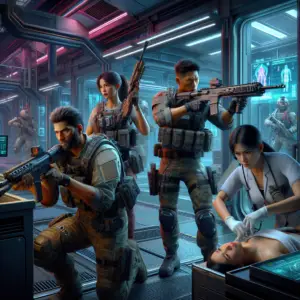A Retrospective on PC Gamer’s Game Reviews
Over the past 30 years, PC Gamer has had the opportunity to review a vast array of video games, ranging from groundbreaking classics that have defined genres to less memorable titles that have faded into obscurity. The publication has celebrated the likes of Half-Life, Civilization 2, and Deus Ex, games that have earned their place in the pantheon of PC gaming history.
However, not all games have been fortunate enough to receive such acclaim. Amidst the celebrated titles, there lies a collection of games that have not stood the test of time, often for good reason. These games, known for their lackluster performance, buggy gameplay, or uninspired content, represent the other end of the spectrum in PC Gamer’s extensive review archives.
In a spirit of reflection and with a touch of curiosity, PC Gamer has embarked on a quest to revisit some of these less stellar games. The goal is not to dwell on their shortcomings but to uncover any redeeming qualities that may have been overlooked. It’s an exploration of the silver linings that exist even in the most critically panned games.
Revisiting the Worst
In the process of selecting the worst-reviewed games for a revisit, PC Gamer established specific criteria to avoid games that were either broken or lacked substantial content worth discussing. The aim was to focus on games that, despite their low scores, still offered something that could be talked about or appreciated in some way.
Excluded from this retrospective were games that failed to function properly, those that could not be run on modern systems without significant technical adjustments, and titles that were so devoid of content that they offered no real substance for critique or commentary.
The types of games that were ultimately chosen for this feature included those with unique concepts, interesting failures, or peculiar qualities that set them apart from the average poorly-received game. It was these characteristics that PC Gamer sought to explore and, perhaps, to find a new appreciation for.
Deer Avenger (1998)
Deer Avenger is a parody game that flips the script on traditional hunting games. Players step into the hooves of Bambo, a deer with an appetite for revenge. The game’s premise involves hunting down human hunters using an arsenal that includes an assault rifle, a rocket launcher, and a slingshot.
The gameplay mechanics are simple, often involving the player scanning a panoramic view of the woods for the sound of footsteps, which signals the presence of a hunter. Once a hunter is found, the player takes them out, and the game concludes with a trophy shot of the hunter’s head mounted on a wall.
Despite its attempt at humor, the game received a low score of 4% from PC Gamer due to its monotonous gameplay and crude humor, which included the ability for Bambo to make prank calls and fart on command, adding little to the overall experience.
However, upon revisiting, it’s clear that the game’s concept has a certain appeal in today’s context. The idea of nature fighting back against human encroachment and destruction is more relevant than ever. The game’s satirical take on the hunting genre could be seen as a crude but early form of environmental commentary.
John Saul’s Blackstone Chronicles (1998)
John Saul’s Blackstone Chronicles is a point-and-click adventure game set in an abandoned asylum, where the player is tasked with saving their son from the ghost of their father. The game’s narrative and atmospheric setting aimed to deliver a chilling experience, but it fell short due to its lackluster puzzles and muddy visuals.
The game’s reception was notably divided between PC Gamer’s UK and US branches, with the UK edition giving it a mere 3% for its tedious gameplay, while the US counterpart awarded it a more generous 79%, citing a drought of quality point-and-click adventures at the time.
Despite the game’s shortcomings, there are elements that stand out positively. The antagonist, Malcolm Metcalf, provides a compelling performance, delivering taunts and insults with a sinister charm that adds to the game’s eerie atmosphere.
Big Brother Series 2: The Game (2000)
The game adaptation of the reality TV show, Big Brother Series 2, was an attempt to capture the essence of the show in a video game format. Unfortunately, it was met with a dismal reception. The game consisted of a series of minigames and was criticized for its poor execution and lack of engaging content.
Playing Big Brother Series 2: The Game was akin to navigating a collection of simplistic memory and dexterity challenges, which were made even more difficult by the game’s inability to run properly on modern machines. Players would control cartoonish representations of the show’s contestants, which added a layer of absurdity to the experience.
However, the game does possess a certain nostalgic charm. The contestant introduction videos serve as a time capsule from the early 2000s, offering a glimpse into the era’s reality TV culture. These videos, with their unpolished and candid nature, provide a fascinating look back at a time when reality TV was still a novel concept.
Leisure Suit Larry: Magna Cum Laude (2004)
The game Leisure Suit Larry: Magna Cum Laude is infamous for its crude humor and objectification, which overshadowed any potential it had for entertaining gameplay. The game’s protagonist, Larry, embarks on a series of misadventures in an attempt to woo various women, a premise that garnered a low score of 3% from PC Gamer for its offensive content and lackluster humor.
The gameplay consists of a collection of mini-games and dialogue choices, but these elements did little to redeem the game’s overall poor taste. The humor, which was intended to be the game’s selling point, was widely regarded as stale and predictable, contributing to its negative reception.
Despite the game’s many flaws, it does have one redeeming feature: it can be exited quickly. This ease of departure from the game may be considered a mercy given its content.
Bravo Romeo Delta (1993)
Bravo Romeo Delta is a Cold War simulation game that puts players in control of the United States or USSR’s nuclear arsenal. The game’s user interface was notoriously complex, featuring multiple screens filled with cryptic commands and little to no guidance on how to navigate them.
With no tutorial and a manual that has since become a relic of the past, players are left to their own devices, often resulting in accidental nuclear catastrophes. The game’s lack of sound and minimalist visuals only added to the confusion, making the act of launching a nuclear strike feel as mundane as entering a PIN at an ATM.
Despite these barriers to entry, there’s a sense that beneath the impenetrable interface lies a deep and engaging simulation. The game’s concept of managing a nuclear arsenal during one of history’s most tense standoffs has the potential to be enthralling, if only the player could decipher how to actually play it.
Plumbers Don’t Wear Ties
The game Plumbers Don’t Wear Ties is an example of an FMV (full-motion video) comedy dating sim that is remembered more for its notoriety than its quality. Released in 1993, it received a score of 3% from PC Gamer, which criticized its lack of interactivity and poor production values.
The game’s format, consisting mostly of still images with voiceover, was a far cry from the immersive experiences gamers were seeking. The narrative choices offered to the player were limited and often led to unsatisfying outcomes, including scenes that were little more than cheap titillation.
Despite these glaring issues, there’s a certain charm to the game’s complete lack of artistry. It’s a spectacle of subpar quality that’s so distinct, it almost becomes fascinating. The game’s remaster, announced by Limited Run Games, has piqued interest for those curious to see if its unique brand of bad can be transformed into something compelling for modern audiences.
Conclusion: The Silver Linings of Gaming’s Less Glorious Past
The journey back through the annals of PC Gamer’s most critically panned games has been one of unexpected discovery. While these titles were once dismissed for their glaring faults, a closer look has revealed that even the worst games can possess unique qualities or serve as cultural artifacts that capture a moment in time.
From the satirical environmental commentary of Deer Avenger to the nostalgic cringe of Big Brother Series 2: The Game, these games have provided more than just a lesson in what not to do in game design. They have offered a window into the evolving tastes and standards of the gaming community over the past three decades.
As PC Gamer continues to review the latest and greatest in the world of gaming, it’s clear that even the missteps of the past have their place in shaping the industry’s future. And sometimes, it’s the games that dared to be different, for better or worse, that remain the most memorable.












